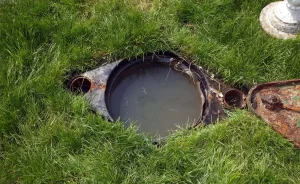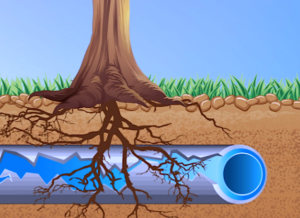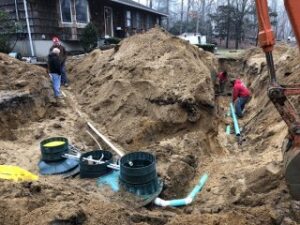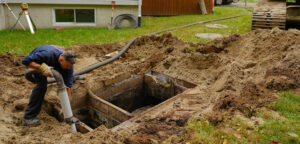Did you know? In 2024, about 35% of septic system issues on Vancouver Island were caused by things like heavy rain and tree roots. This shows just how important it is to know and deal with local factors affecting your septic system. To help you dodge these common problems and keep your system running well, let’s dive into the top causes of septic system backups and what you can do to prevent them.
- Heavy Rainfall and Flooding
In Vancouver Island’s coastal climate, heavy rainfall and flooding can severely impact septic systems. The high volume of rain can overwhelm the septic system, leading to backups and overflows. When the soil surrounding the septic system becomes saturated, it loses its ability to absorb wastewater efficiently, causing backups in the drain field and potential system failure.
A 2024 report highlighted that heavy rain contributed to 40% of septic system backups on Vancouver Island. This is especially critical in areas with poor drainage or low-lying land where water accumulation is a frequent issue. To mitigate these problems, proper grading and maintaining a clear drainage path around your system can help prevent excessive water from affecting its performance.

2. Tree Roots from Local Vegetation:
Tree roots are another common issue affecting septic systems on Vancouver Island. The island’s lush vegetation and tree cover can lead roots to invade septic lines and the drain field, disrupting the system’s function. Roots are attracted to the moisture and nutrients present in the wastewater, which can cause blockages and damage to pipes.
A survey in 2024 found that root intrusion was responsible for 25% of septic system backups in the region. The problem is exacerbated by the fast-growing, aggressive root systems of local trees such as maples and alders. To prevent root damage, it’s important to keep trees and shrubs away from septic system components and consider regular inspections to catch and address root issues early.

3. Inadequate System Maintenance
Neglecting regular maintenance is a leading cause of septic system backups. Many homeowners fail to have their systems inspected regularly, leading to undetected issues that can escalate into major problems. Regular maintenance helps identify and fix small issues before they become costly repairs.
Steps for Proper Maintenance:
- Schedule annual inspections by a professional.
- Pump your septic tank every 3 to 5 years.
- Check for signs of leaks or unusual odors.
- Keep records of all maintenance and repairs.
4. System Design Issues for Local Conditions
System design flaws can also lead to backups, especially when systems are not tailored to local conditions. In Vancouver Island, where soil types and weather conditions vary, using standard designs without considering these factors can result in poor performance. For example, inadequate soil percolation rates or improper sizing of the drain field can lead to system overloads and backups.

5. Environmental Impacts:
Designing a system that considers local environmental factors helps in managing wastewater more effectively. Customizing the design to suit specific soil and weather conditions improves the system’s efficiency and longevity, reducing the likelihood of backups and extending the system’s service life.
6. Aging Systems in Older Homes
Older septic systems, common in many Vancouver Island homes, present unique challenges. Systems installed decades ago may not meet current standards or handle modern usage effectively. As systems age, they become more prone to failures and inefficiencies, leading to potential backups and costly repairs.
An aging septic system is generally considered too old when it’s over 20 years old, or if you notice frequent problems like slow drains or backups. Upgrading to a modern system can improve performance, and efficiency, and reduce maintenance costs. Regular inspections are crucial to assess the condition of older systems and determine when it’s time for a replacement.
With a solid understanding of the common causes of septic system backups and the signs that indicate trouble, you’re better equipped to handle and prevent issues. But maintaining a healthy septic system goes beyond just reacting to problems. It involves proactive steps and understanding the broader impacts of your local environment on your system. Let’s dive into how proper maintenance practices and awareness of environmental factors can keep your septic system functioning efficiently and avoid unexpected disruptions.

Signs of a Failing Septic System
Understanding the early warning signs of a failing septic system can help you tackle problems before they turn into backups. On Vancouver Island, where environmental factors can stress your system, being aware of these signs is especially important.
Indicators to Watch For:
- Slow Drainage: If your sinks, showers, or toilets are draining more slowly than usual, it could signal a problem with your septic system.
- Unpleasant Odors: Foul smells around your property or inside your home often indicate that the septic system isn’t functioning properly and needs immediate attention.
- Pooling Water: Water pooling in your yard or near the septic tank might mean that the system is overflowing or the drain field is saturated.
Promptly addressing these signs can prevent a minor issue from escalating into a major problem. Regular inspections and awareness of these symptoms are key to maintaining your septic system’s health.
Emergency Preparedness for Septic System Failures
When a septic system emergency strikes, knowing how to respond can make a big difference in minimizing damage and resolving the issue quickly.
Steps to Take in an Emergency:
- Avoid Water Use: Refrain from using water in your home to prevent further strain on the system and reduce the risk of backups.
- Locate Your Septic System: Knowing where your septic tank and drain field are situated can help you quickly assess the situation and guide professionals.
- Contact a Professional: Reach out to a septic system expert to address the issue as soon as possible. Quick action can prevent more extensive damage and costly repairs.
Being prepared for a septic system emergency ensures that you can manage the situation effectively and mitigate potential issues. Regular maintenance and knowing these steps can help you stay on top of your system’s health.Common Septic System Issues and How to Fix Them


